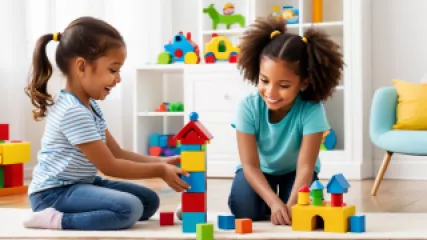Effective Strategies for Sibling Harmony
Sibling rivalry is a common challenge that many parents face. The constant bickering, fighting over toys, and competing for attention can make family life stressful and tense. However, there are effective strategies you can implement to promote sibling harmony and create a more peaceful environment at home. In this article, we will explore various approaches and techniques that can help you address sibling rivalry and foster positive relationships between your children.
1. Set Clear Expectations
One of the first steps in resolving sibling conflicts is to establish clear expectations for behavior. Talk to your children about how you expect them to treat each other and what behaviors are not acceptable. Encourage kindness, respect, and empathy towards one another. By setting these expectations early on, you provide your children with guidelines for their interactions and help them understand the importance of treating each other with love and compassion.
2. Foster Individuality
Recognize and celebrate the unique qualities and interests of each child. Encourage their individuality and avoid comparing them to one another. When children feel valued for who they are as individuals, they are less likely to engage in competitive behaviors to seek attention or approval. Help them discover their own passions and strengths, and encourage them to support and appreciate each other's differences.
3. Encourage Cooperative Play
Promote activities that require cooperation and teamwork. Engage your children in games, projects, or chores that can only be accomplished by working together. This allows them to develop essential skills such as communication, compromise, and problem-solving. Cooperative play not only strengthens their bond but also teaches them the value of collaboration and the benefits of supporting one another.
4. Teach Conflict Resolution
Conflict is a normal part of human relationships. Rather than trying to eliminate conflict entirely, focus on teaching your children how to resolve conflicts in a healthy and respectful manner. Teach them active listening skills, encourage them to express their feelings using "I" statements, and guide them towards finding mutually agreeable solutions. By equipping your children with effective conflict resolution skills, you empower them to work through disagreements and build stronger relationships.
5. Avoid Taking Sides
As a parent, it's important to remain neutral in sibling conflicts and avoid taking sides. Taking sides can fuel the rivalry and make the situation worse. Instead, act as a mediator and help your children find common ground. Listen to each child's perspective without judgment and encourage them to see things from the other's point of view. By remaining neutral, you promote fairness and encourage your children to work together towards resolution.
6. Allocate Special Time for Each Child
Make an effort to spend quality one-on-one time with each of your children. This individualized attention helps them feel valued and reduces feelings of jealousy or competition. Plan special activities or outings that cater to each child's interests and give them an opportunity to bond with you without the presence of their siblings. By dedicating this time, you show your children that they are loved and appreciated as individuals.
7. Model Positive Behavior
Children learn by observing their parents' behavior. Be mindful of how you interact with your own siblings or family members. Model respectful communication, cooperation, and empathy in your own relationships. When your children witness positive behavior, they are more likely to emulate it in their own interactions with each other. Your actions serve as a powerful example and can significantly influence the dynamic between siblings.
8. Encourage Open Communication
Establish an environment where open communication is encouraged. Encourage your children to express their thoughts, feelings, and concerns without fear of judgment or retribution. Regularly check in with each child individually and create opportunities for them to share their experiences with you. By fostering open communication, you create a safe space for your children to discuss their sibling relationship and work through any challenges they may be facing.
9. Celebrate Sibling Bonding
Highlight the importance of the sibling bond and celebrate it as a special relationship. Encourage your children to engage in activities together that they both enjoy. Plan regular family outings or game nights where siblings can bond and have fun together. By promoting positive experiences and creating opportunities for sibling bonding, you help strengthen their connection and foster a sense of camaraderie.
10. Seek Professional Help if Needed
If sibling rivalry persists despite your efforts, and it significantly impacts your children's well-being or family dynamics, consider seeking professional help. A family therapist or counselor can provide guidance and support in navigating complex sibling dynamics. They can help identify underlying issues and provide strategies tailored to your family's unique situation.
Sibling harmony is not an overnight achievement. It requires patience, consistency, and a commitment to fostering positive relationships between your children. By implementing these effective strategies, you can create an environment where love, respect, and cooperation flourish, ultimately leading to stronger sibling bonds and a more peaceful home.






